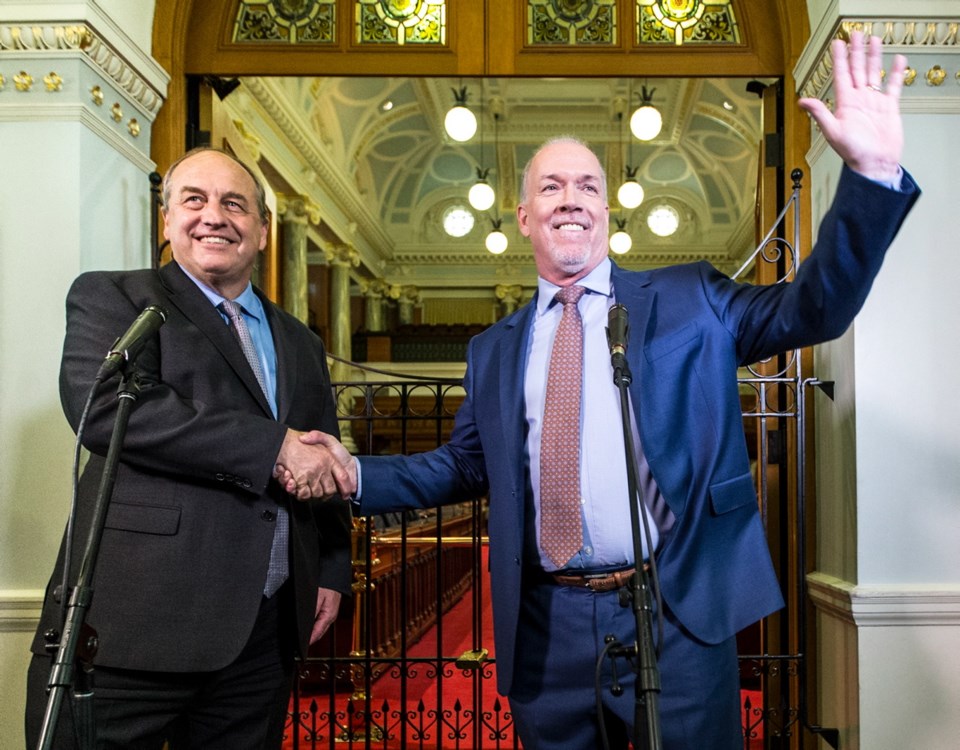 The NDP-Green Party Confidence and Supply Agreement is a pretty cumbersome title.
The NDP-Green Party Confidence and Supply Agreement is a pretty cumbersome title.
Think of it instead as John and Andrew’s pre-nuptial agreement. Like most pre-nups, it’s a contract between two parties on sharing assets, signed because there’s an imbalance in the assets (41 NDP seats and three Greens) going into the relationship.
The big difference is that pre-nups generally take effect when marriages fall apart. The confidence agreement is much more about keeping the political partnership together for as long as possible.
It’s a measure of how important it is to the incoming NDP government’s future that premier-designate John Horgan is creating an entire division in the premier’s office devoted to nurturing and sustaining the agreement. He announced Tuesday a “confidence and supply agreement secretariat” with its own executive director and likely more staff to come.
The director will be Donna Sanford, currently a senior policy analyst at the climate-action secretariat.
That’s where Green Party Leader Andrew Weaver’s new chief of staff, Liz Lilly, worked prior to retiring and becoming active in the Green election campaign. Sanford has been active with local NDP campaigns for years. She is the daughter of 1970s-era NDP cabinet minister Karen Sanford and the wife of former Victoria mayor Dean Fortin.
Horgan said the secretariat will be a co-ordination effort “designed to be open and transparent so that the public understands we want to make the minority situation work for B.C.”
“It will make sure that not just the Green caucus, but the Liberal caucus has access to information about how decisions are being made. My experience as an opposition member for some time now was that the previous government was not always forthcoming, whether it was through freedom of information or direct questions.
“I want to reverse that. I want to make sure the public has confidence in the decisions that are being made and that’s why we’re putting in place the secretariat.”
But the taxpayer-financed secretariat has an entirely political imperative, which is to keep the agreement — and the NDP government — alive.
The B.C. Liberals sounded a bit bemused by being included in the mission statement. One cabinet minister noted privately that cabinet confidentiality would (theoretically) preclude them from sharing too much. Ministers all swear oaths of confidentiality when taking office. But the confidence agreement gives the Greens a wide range of access to government decision-making.
He’s also watching with interest a divergence that might crop up over the campaign-finance reform that both the NDP and Greens committed to in the agreement. They promise to “introduce” the bill in the first session. But it might not take full effect for another year.
That would give the NDP (and Liberals) time to keep taking union and corporate donations while the Greens would be honour-bound to hold to the ban they imposed on themselves last year. After the Vancouver Sun’s Vaughn Palmer pointed out the timing matter, the Greens expressed some dissatisfaction with the idea of stretching out implementation.
Both sides have already agreed to amend the deal’s commitment to recall the house within 30 days of the swearing-in, choosing instead to move it past Labour Day.
Liberals are now resigned to ceding power, but they’ll be keeping a hawk eye on the confidence agreement for any such variations. The deal is the only thing that will keep the NDP in power, and the only thing keeping the Liberals away from the do-over election they want.
It was obviously the product of compromises, and the test is whether those will survive. A key one is the Greens ceding their position that electoral reform would be imposed for the next election without a referendum. Instead, the deal calls for introduction of a bill in the first session (same as campaign finance reform) that will set a referendum on proportional representation next year. If British Columbians vote yes in the referendum, the new system would take effect for the next — scheduled — election.
If the confidence deal fails before the end of the term, there would be an immediate election. There’s not much doubt it would be held under the old rules, as creating a new voting system for that contest would be impossible.



